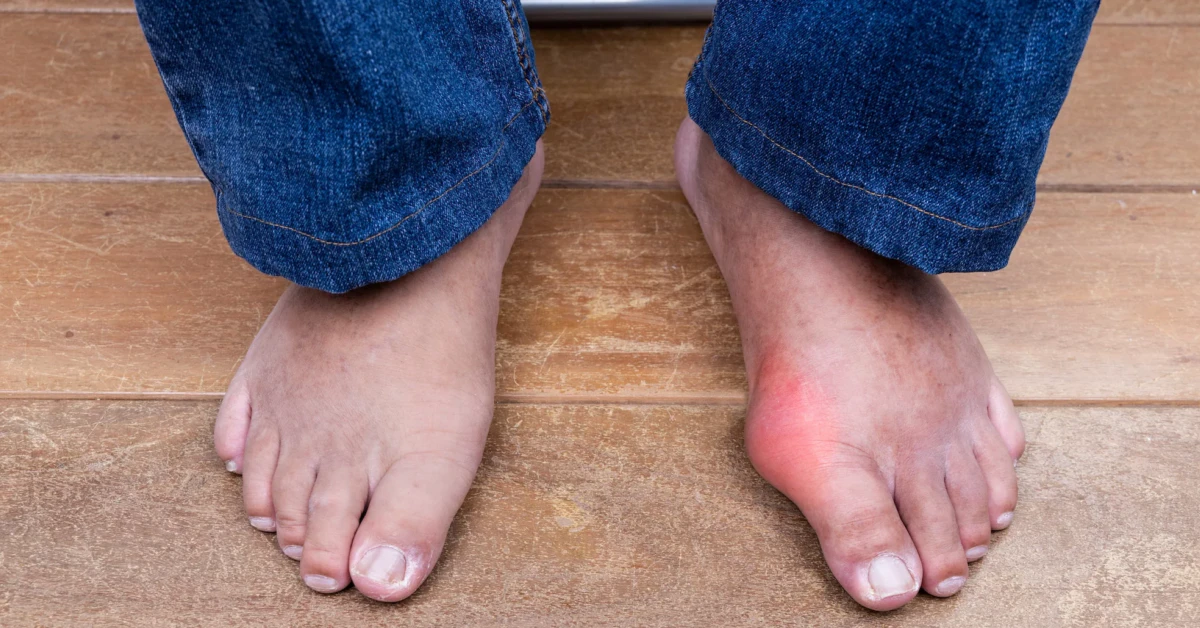Alright, let’s just take a breath for a sec. If you’re reading this, maybe you’re in pain right now, or maybe you’re worrying about what tomorrow’s going to feel like. Gout can hit hard, and it doesn’t care if you have plans or deadlines or dreams. When even your bedsheet feels like it’s made of sandpaper on your toe… yeah, that’s not just “a little arthritis.” I see you.
So, let’s talk about the heavy stuff in a way that doesn’t feel so heavy. You’re here because you want to know: does gout qualify for disability? Maybe your doctor mentioned it. Maybe a friend suggested it, or you just started wondering if there’s a way to get some much-needed breathing room and support. I’m glad you’re here. Let’s have a real, honest chat about it. No fluff, no empty promises. Just the truth, as if we’re friends sitting across a table, sharing stories.
What Is Gout, Really? It’s Not “Just a Sore Toe.”
First off, if anyone ever tells you gout is “just some joint pain,” you have my full permission to roll your eyes (or, you know, just ignore them and keep reading here). Gout is a type of inflammatory arthritis, and it’s caused by uric acid crystals building up in your joints. Imagine tiny shards of glass, just stabbing away inside your big toe, ankle, or knee. Fun, right? Not even a little.
It’s not rare, either. Millions of people deal with this. The pain can hit out of nowhere and leave you limping, cursing, and rearranging your whole day—or your whole life. For some folks, it’s a once-in-a-while thing. For others, it’s chronic and relentless, and it doesn’t just hurt—it messes with your sleep, your ability to work, and even your mood. If you’re here, I bet you know exactly what I mean.
Symptoms That Go Beyond “Ouch”
Let’s get specific. Gout usually shows up as:
- Sudden, intense joint pain (often at night—because why not?)
- Redness, swelling, and tenderness (the kind where you don’t even want a sock touching it)
- Lingering discomfort, even after the “attack” fades
- Limited mobility—sometimes you just can’t move that joint at all
And here’s the kicker: the psychological toll. Dealing with pain day in and day out can wear anyone down. It’s not “just physical.” You’re allowed to acknowledge that, and you’re not weak for feeling it.
How Is Gout Different from Osteoarthritis?
Maybe you’ve also wondered, how hard is it to get disability for osteoarthritis? Gout and osteoarthritis (OA) are both joint destroyers, but they’re not twins. OA is a wear-and-tear condition, often gradual and steady, while gout comes in flares—sometimes unpredictable, always unwelcome. The Social Security folks look at both, but the way they evaluate you can be a bit different. For OA, it’s about persistent, chronic pain and loss of function over time. For gout, it’s about the frequency, severity, and impact of your flare-ups, plus any long-term joint damage.
Does Gout Qualify for Disability? Let’s Cut to the Chase
This is where a lot of folks get frustrated, because the answer isn’t a simple yes or no. Can I get disability for gout? Yes, you can—but it’s not automatic, and it’s definitely not easy. The Social Security Administration (SSA) doesn’t have a line in their “Blue Book” (that’s their official guide to qualifying conditions) just for gout. What they do have is a section for inflammatory arthritis, which can include gout if your case is severe enough.
So, what does that mean in real life? Basically, you need to show that your gout is so severe, so frequent, or so damaging that it keeps you from doing any kind of substantial gainful work—not just your old job, but any job you could reasonably be expected to do. That’s a high bar, and it’s one that trips up a lot of applicants. But it’s not impossible.
What the SSA Looks For
Here’s the kind of stuff they’ll want to see:
- Detailed medical records (diagnoses, flare-up history, medications, test results—basically, the works)
- Evidence that your gout causes serious limitations with walking, standing, using your hands, or other basic work tasks
- Proof that you’ve followed treatment plans but still have severe symptoms
- Frequent, severe flare-ups or permanent joint damage
- Doctor’s notes that spell out your limitations (not just “patient has gout,” but really describing what you can and can’t do)
The more detail, the better. Think of your medical records as your story—make sure they tell the real story, not just the highlight reel.
Table: Gout vs. Osteoarthritis in Disability Claims
| Criteria | Gout | Osteoarthritis |
|---|---|---|
| SSA Blue Book Listing | Inflammatory arthritis (if severe) | Major dysfunction of a joint (if severe) |
| Typical Symptoms | Sudden, severe flare-ups; joint swelling | Chronic, progressive joint pain and stiffness |
| Proof Required | Frequent flares, significant limitations, compliance with treatment | Consistent pain and mobility loss, imaging evidence |
| Common Hurdles | Inconsistent symptoms, episodic nature | Gradual progression, need for imaging/medical proof |
So, how hard is it to get disability for osteoarthritis? Similar hurdles: lots of documentation, lots of proof, and you have to show that the condition stops you from working, not just that it’s painful or inconvenient.
Real-World Example: When the System Works (and When It Doesn’t)
Let me tell you about “Sam” (not their real name, obviously). Sam had gout for years, the kind that turned business trips into nightmares and made family vacations a roll of the dice. Sam applied for disability after his flares got so bad he could barely get out of bed for days at a time. He was denied the first time—pretty common, actually. But Sam didn’t give up. He went back to his doctor, got better records, and kept a pain diary. On appeal, with more detailed documentation and a supportive doc, he finally got approved. It took almost two years, but it happened.
On the flip side, “Jess” also had gout, but her flares were less frequent and she could still manage light office work between attacks. Even though she felt awful during the worst flares, the SSA decided she could still do “sedentary” work, so her claim was denied. Unfair? Maybe. But it’s a reminder: the system focuses on what you can do, not just what you can’t—and you need the paperwork to back it up.
The Disability Application Process for Gout: What to Expect (and How Not to Lose Your Mind)
Let’s be honest: the disability application process can feel like a second full-time job, minus the paycheck. It’s paperwork, phone calls, doctor visits, and a whole lot of waiting. But if this is the road you need to take, it helps to know what’s coming.
Step-by-Step: How to Apply
- Gather your medical records. Get everything: diagnoses, lab results, doctor’s notes, pain diaries, even emails with your doctor if they talk about your condition. The more, the better.
- Talk to your healthcare providers. Don’t be shy—ask your doctor if they think your gout is disabling. Be clear about how it actually affects your life, not just what they see in the office.
- Fill out the application. You can do this online or in person. Be honest, and don’t downplay your symptoms. This is not the time to be stoic.
- Wait… and wait. It can take months to hear back. Most people are denied the first time—don’t panic. Appeals are super common.
- If denied, appeal. This is where many cases are won. Get more documentation, maybe talk to a disability lawyer or advocate, and keep going.
Tips from People Who’ve Been There (and Experts Who Help)
Here’s some advice that I wish everyone knew before starting:
- Keep a daily pain or symptom diary. Seriously, this helps so much. Write down when you have flares, how bad they are, and what you can’t do because of them.
- Ask your doctor for a detailed statement about your limitations—not just “patient is disabled,” but specifics like “can’t stand more than 10 minutes,” “can’t walk without a cane,” or “misses work 5 days a month due to flares.”
- Don’t give up after a denial. Most people who eventually get benefits had to appeal at least once.
- Consider talking to a disability advocate or lawyer. They know the system and can help you avoid common mistakes.
Possible Risks, Drawbacks, and Things Nobody Tells You
It’s not all sunshine and approval letters. There are some real risks and trade-offs to consider:
- It can take a long time. Months, sometimes years. Be prepared for paperwork, follow-ups, and maybe even a hearing.
- You might get denied. It’s not personal; the system is just very strict. But it’s also not the end of the road.
- Your income could change. Disability benefits aren’t always enough to replace a full paycheck. You might need to budget differently or look for other support.
- It can be emotionally tough. The process can make you feel like you have to “prove” you’re sick, which is exhausting and sometimes demoralizing.
If this all sounds overwhelming, you’re not alone. I’ve seen folks burn out on the process, but I’ve also seen people get the help they need and finally start to breathe again. If you’re struggling, reach out to a counselor, support group, or just a friend who gets it. Your mental health matters, too.
Balancing Benefits and Risks: Is Disability the Right Choice for You?
Here’s the thing—they don’t hand out disability benefits for gout like candy. And honestly, you probably wouldn’t be reading this if you didn’t need help. But before you leap in, take a minute to weigh the good and the not-so-good.
Weighing Your Options: It’s Not Just About Money
Ask yourself:
- How often are your gout flares? Are they getting worse?
- Can you realistically keep working—at any job? Or is even basic stuff (like sitting at a desk, typing, or standing at a register) out of reach most days?
- Have you tried changing your job, reducing hours, or getting accommodations?
- How is all this affecting your mental health, your relationships, your sense of self?
It’s okay if you don’t have all the answers. It’s also okay to change your mind along the way. Some people try to keep working until they just can’t anymore; others apply earlier, hoping to avoid a total health crash. There’s no single “right” path, only what works for you.
Building Your Support System (Because You Shouldn’t Have to Do This Alone)
If you’re thinking about applying for disability, or even just trying to make sense of your options, don’t go it alone. There are people who get it—advocates, lawyers, online support groups, even your doctor (if they’re a good one). Find your tribe. Ask questions. Lean on each other.
And if you need a place to start, check out local disability advocacy organizations or the Social Security Administration’s official site for step-by-step guides. There’s no shame in asking for help. In fact, it’s one of the bravest things you can do.
So, Does Gout Qualify for Disability? Let’s Wrap This Up
Whew. That was a lot, right? And yet, I hope it felt more like a conversation than a lecture. Here’s what I want you to take away: yes, gout can qualify for disability, but it’s not a given. The process is tough, sometimes unfair, but not impossible. You need solid documentation, a supportive doctor, and a willingness to stick with it—even when it feels like you’re shouting into the void.
If you’re ready to start, take that first step. Gather your papers. Talk to your people. Ask questions. And if you get knocked down, get back up. Because you deserve support, you deserve relief, and you deserve to have your life (and your dignity) back from gout. If you’re feeling lost, drop a comment or reach out—sometimes just hearing “me too” is enough to keep going.
And hey, if you’ve made it this far, thank you for letting me be part of your journey. What do you think? Have you started the process? Got a story to share, or a question that’s been bugging you? Share it below. Let’s help each other navigate this, one honest conversation at a time.
Take care of yourself—truly. You’re stronger than you know.

























Leave a Reply
You must be logged in to post a comment.